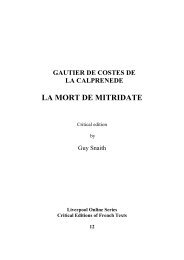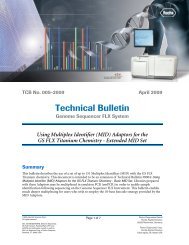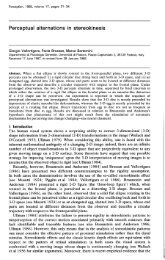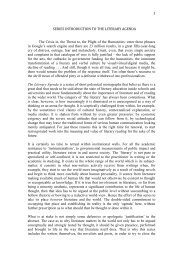LA MORT DE MITRIDATE - University of Liverpool
LA MORT DE MITRIDATE - University of Liverpool
LA MORT DE MITRIDATE - University of Liverpool
You also want an ePaper? Increase the reach of your titles
YUMPU automatically turns print PDFs into web optimized ePapers that Google loves.
La Mort de Mitridate<br />
simple matrice tragique’. 39 With Plutarch’s sentence before him, La Calprenède<br />
will have found himself in a similar position as regards Mithradates. Florus does<br />
not describe the death either: referring to Mithradates’ one final plan to invade<br />
Italy from the north, he writes: ‘Mais son dessein ne peust pas reussir, d’autant<br />
qu’il fut prevenu par la révolte de ses subjects, & par la meschanceté de son fils<br />
Pharnaces, qui le mit à un tel desespoir qu’il chassa avec le fer, l’ame que le<br />
poison n’avoit peu arracher de son corps’. 40 La Calprenède concedes that Appian<br />
does provide more detail, the historian describing how Mithradates had poison<br />
hidden in the pommel <strong>of</strong> his sword, how two <strong>of</strong> his daughters, Mithradatis and<br />
Nyssa, begged him to let them be the first to drink the poison and how they<br />
promptly collapsed, while nothing happens to Mithradates because <strong>of</strong> how he has<br />
innoculated himself out <strong>of</strong> fear <strong>of</strong> assassination. Appian even comments that such<br />
antidotes are still called ‘Mithridat’. 41 In direct speech the king asks one <strong>of</strong> his<br />
captains, a Gaul named Bituitos, to kill him: ‘Et là où j’ay evité (dit-il) tant<br />
d’autres dangers, maintenant ne me suis sceu garder de la trahison & infidélité de<br />
mes enfans, de mes amis & de mes gendarmes’. 42 In tears, Bituitos runs him<br />
through with a sword. But La Calprenède felt that there was still not enough here<br />
‘pour en pouvoir tirer le subject entier d’une Tragedie’ (p. 79).<br />
Nevertheless, La Calprenède has an ending to work back from, and as Forestier<br />
commented as regards Corneille and the one sentence mentioning Surena in<br />
Plutarch: ‘Tout restait à inventer’. 43 Given the material at his disposal, La<br />
Calprenède thinks likewise. What he did have was the adversarial relationship <strong>of</strong><br />
Mithradates and Pharnaces and the linking <strong>of</strong> son with father’s death. In Appian<br />
the situation is that Mithradates, who has been circling the Black Sea in order to<br />
strike at the Romans from the European side <strong>of</strong> the Bosphorus, has reached<br />
Panticapaeum in the Crimea, the present Ukrainian city <strong>of</strong> Kerch. His own<br />
soldiers, augmented by Roman deserters, are camped outside the city. Pharnaces<br />
turns them against his father who has hatched a daring but unpopular plan to<br />
invade Italy from the north. Mithradates does leave the city to try to reason with<br />
the soldiers but is forced back inside. Through a series <strong>of</strong> messengers to<br />
Pharnaces, Mithradates tries to negotiate safe passage out <strong>of</strong> the city, but seeing<br />
that this is impossible he commits suicide rather than being taken captive and<br />
handed over to the Romans. Thus La Calprenède had found a situation resembling<br />
that <strong>of</strong> several successful plays already performed: that <strong>of</strong> Republican Rome<br />
39 Essai de génétique théâtrale, p. 40.<br />
40 Florus, Histoire romaine, trans. by F. N. Coeffeteau (Paris, 1632), pp. 72-73.<br />
41<br />
Appian, Des Guerres des Romains, trans. by Claude de Seyssel (Paris: Julian, 1580),<br />
fol. 164 v .<br />
42<br />
Ibid.<br />
43<br />
Essai de génétique théâtrale, p. 40. With Mithridate, Forestier states that Racine had<br />
no intention <strong>of</strong> just rewriting La Mort de Mitridate. Having found in ‘la mort du héros<br />
trahi par son fils Pharnace allié aux Romains’ his ‘matrice tragique’, ‘tout le reste était<br />
à réinventer’ (Jean Racine, p. 454).<br />
14

















